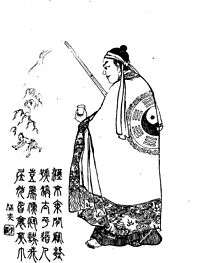Zhang Jue
| Zhang Jue | |||||||
| Traditional Chinese | 張角 | ||||||
|---|---|---|---|---|---|---|---|
| Simplified Chinese | 张角 | ||||||
| |||||||

| Part of a series on |
| Taoism |
|---|
 |
|
Deities |
|
Holy places |
|
Organisations |
| Portal Taoism |
Zhang Jue (died 184)[1] was the leader of the Yellow Turban Rebellion during the late Eastern Han dynasty. He was said to be a follower of Taoism and a sorcerer. His name is sometimes read as Zhang Jiao, since the Chinese character of Zhang's given name can be read as either "Jiao" or "Jue". "Jue" is the traditional reading, while "Jiao" is the modern one.
Yellow Turban Rebellion
Giving himself the title of "Great Teacher", Zhang Jue led the Yellow Turban Rebellion with his younger brothers Zhang Bao and Zhang Liang in a campaign called "The Way of Heaven" or "The Way of Peace". He and his brothers had their own power: Zhang Bao was the General of Land, Zhang Liang was the General of the People; and Zhang Jue was the General of Heaven. The Yellow Turbans claimed to be Taoists, and rebelled against the Han in response to burdensome taxes, rampant corruption, and famine and flooding, which were seen as indications that the Han ruler had lost the mandate of heaven.
The Yellow Turbans conquered much in the early years of the rebellion, but later could not hold out against Han generals Liu Bei, Dong Zhuo and Sun Jian. Although the Yellow Turbans still remained capable even in face of their more powerful foe, they were nonetheless torn apart upon the death of their leader, Zhang Jue, and were eventually defeated and dispersed.
Large groups of Yellow Turbans roamed through China for years after the rebellion's defeat, most of them eventually joining the army of warlord Cao Cao, whose politics of agrarian reform closely matched Zhang Jue's own program.[2]
In Romance of the Three Kingdoms
Zhang Jue is also featured in Luo Guanzhong's historical novel Romance of the Three Kingdoms. He is introduced in chapter 1 as follows:
At that time, there lived three brothers in Julu Commandery: Zhang Jue, Zhang Bao and Zhang Liang. Zhang Jiao was a failure in the county level examination. He had gone into the mountains to gather some medicinal herbs, when he came across an old man; the old man had a youthful countenance, and was carrying a fat-hen walking stick. The old man beckoned Jue into a cave, presented him with a book in three volumes which had come from the heavens, then said, "This book is called The Essential Art of Great Peace. Once you have mastered its contents, you will represent the heavens in spreading this knowledge, and thereby save all of mankind. If you start to have second thoughts, there will be terrible consequences for you." Jue enquired as to the old man's name. The old man said, "I am the old immortal spirit from the southern lands."[3] With that, the old man vanished into thin air. Upon receiving this book, Jue practiced night and day. Eventually, he could summon the wind and rain, and came to be known as the Great Peace Taoist. (Wikisource translation)
He then goes on to found the rebellion known as the Yellow Turban Rebellion. Little time is devoted to Zhang Jue in the book, and his death is given a line in the second chapter: "Zhang Jue had died before his (Huangfu Song's) arrival."
In popular culture
Zhang Jue appears as a playable character in Koei's Dynasty Warriors and Warriors Orochi video games series, as well as serving as an antagonist in Capcom's Destiny of an Emperor for the Nintendo Entertainment System. He is referred to as "Zhang Jiao" in these games. He is also seen as one of the antagonists of the light gun shooting game SEGA Golden Gun.
See also
Notes
- ↑ de Crespigny, Rafe (2007). A biographical dictionary of Later Han to the Three Kingdoms (23–220 AD). Brill. p. 1058. ISBN 978-90-04-15605-0.
- ↑ The History of China, by Kenneth Pletcher. ISBN 9781615301096. Rosen Publishing, New York, 2010
- ↑ Another name for Zhuangzi. After his death, Zhuangzi was deified by his followers. They said that he would later travel to the north, and ascend to the heavens as an immortal in a blaze of fire. In the first year of the Tianbao era (742), Emperor Xuanzong of Tang gave Zhuangzi the appellation true man from the southern lands. (三國演義校注, page 10, note 24, ISBN 978-957-9113-05-2)
References
- Chen Shou (2002). Records of the Three Kingdoms. Yue Lu Shu She. ISBN 978-7-80665-198-8.
- Luo Guanzhong (1986). Romance of the Three Kingdoms. Yue Lu Shu She. ISBN 978-7-80520-013-2.
- Lo Kuan-chung; tr. C.H. Brewitt-Taylor (2002). Romance of the Three Kingdoms. Tuttle Publishing. ISBN 978-0-8048-3467-4.
| Preceded by Founded |
Great Teacher of the Yellow Turbans 184–188 |
Succeeded by Zhang Bao |